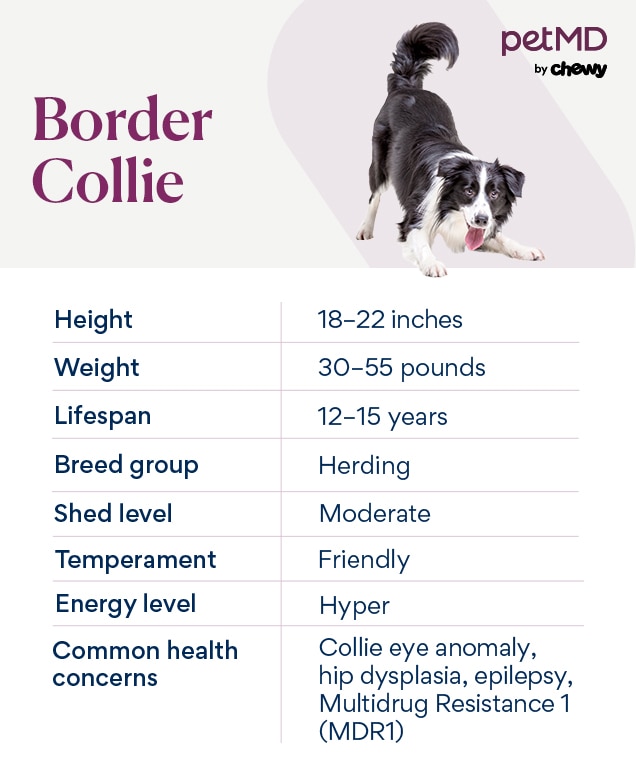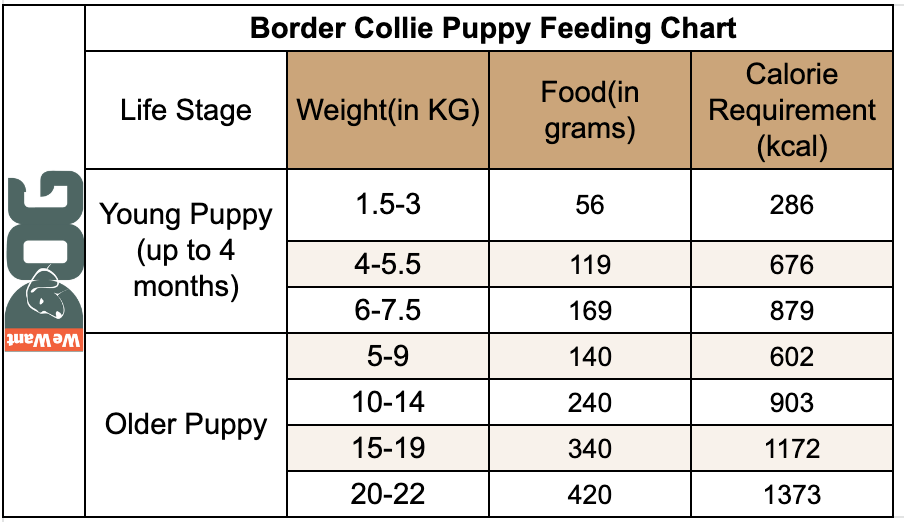Feeding a Border Collie puppy correctly is crucial for its growth and health. You must understand their dietary needs to ensure they thrive.
Border Collies are known for their energy and intelligence. A balanced diet helps support these traits. Puppies need more nutrients than adult dogs because they are growing. This growth phase requires specific feeding routines and food types. Knowing what to feed your Border Collie puppy will help prevent health issues and support their active lifestyle.
This guide will provide you with all the essential information on feeding your Border Collie puppy. From meal frequency to the best types of food, we’ll cover everything you need to know to keep your furry friend healthy and happy. Let’s dive in!
Choosing The Right Food
Feeding a Border Collie puppy right is crucial for its growth and health. They need the right balance of nutrients to support their energy levels and development. This guide will help you make an informed decision on what to feed your Border Collie puppy.
Commercial Vs. Homemade
Commercial dog food offers convenience and balanced nutrition. Reputable brands ensure their products meet the nutritional needs of puppies. They are formulated to provide the right mix of proteins, fats, and carbohydrates.
On the other hand, homemade dog food allows you to control the ingredients. You can ensure the food is fresh and free from additives. But it requires a good understanding of a puppy’s nutritional needs. Balancing the diet can be challenging.
Consider consulting with a vet when choosing between these options. They can guide you on the best diet plan for your Border Collie puppy.
Reading Food Labels
Reading food labels is vital to ensure your puppy gets the right nutrients. Look for the following on the label:
- Protein Content: At least 22% for growth.
- Fat Content: Around 8% for energy.
- Vitamins and Minerals: Essential for development.
- Ingredients: Meat should be the first ingredient. Avoid fillers like corn and soy.
Also, check for any artificial colors, flavors, or preservatives. These can be harmful to your puppy.
By understanding food labels, you can make a better choice for your puppy’s diet. This ensures they get the nutrients they need to grow strong and healthy.

Credit: www.lovelybordercollie.com
Feeding Schedule
Creating a proper feeding schedule for your Border Collie puppy is crucial. It helps them develop healthy eating habits and ensures they get the right nutrients. A well-planned schedule can prevent overfeeding and digestive issues.
Frequency Of Meals
Border Collie puppies need frequent meals due to their high energy levels. Here’s a simple meal frequency guideline:
| Age | Meals per Day |
|---|---|
| 8-12 Weeks | 4 Meals |
| 3-6 Months | 3 Meals |
| 6-12 Months | 2 Meals |
| 12 Months and Older | 1-2 Meals |
Four meals a day for young puppies ensures they receive adequate nutrition.
As they grow, reduce the frequency to three meals. After six months, shift to two meals daily.
Establishing Routine
Consistency is key for a Border Collie puppy’s feeding routine. Feed them at the same times each day.
- Morning Meal: 7:00 AM
- Midday Meal: 12:00 PM
- Afternoon Meal: 5:00 PM
- Evening Meal: 8:00 PM
Set up a quiet feeding area to avoid distractions. This helps them eat calmly and completely.
Avoid feeding close to playtime. Allow an hour before and after meals. This prevents stomach issues.
Keep fresh water available at all times. Puppies need hydration along with their meals.
By following these guidelines, you ensure your Border Collie puppy grows strong and healthy. A good feeding schedule forms the foundation of their diet.
Portion Sizes
Feeding a Border Collie puppy can be challenging. Their energy levels are high and they need the right nutrition to grow strong. Proper portion sizes are crucial to ensure they get the nutrients they need without overeating.
Age-based Portions
Puppies grow fast and their food needs change. A young puppy, up to 12 weeks old, should eat four times a day. From 3 to 6 months old, feed them three times a day. After 6 months, twice a day is usually enough. Adjust portions based on their age.
Always check the feeding guidelines on your dog food package. These guidelines often provide daily portions based on age. Divide the daily portion by the number of meals. This ensures your puppy eats the right amount at each meal.
Weight Management
Border Collies are active dogs. They burn a lot of calories. Monitor their weight regularly. Adjust portions if they gain or lose too much weight. Overfeeding can lead to obesity. Underfeeding can cause malnutrition. Both are harmful.
Use a measuring cup to ensure accurate portions. Avoid feeding your puppy table scraps. These can upset their nutritional balance. Stick to a consistent feeding schedule. Regular vet check-ups can help monitor their weight and health.

Credit: www.petmd.com
Nutritional Needs
Feeding a Border Collie puppy involves understanding their unique nutritional needs. These active pups need a balanced diet for healthy growth. Proper nutrition ensures they have the energy for play and learning. Let’s explore the essential nutrients and what to avoid.
Essential Nutrients
Protein is vital for muscle development. Look for high-quality sources. Chicken, lamb, or fish are excellent options. Carbohydrates provide energy. Choose whole grains like brown rice and oats. Healthy fats support brain development. Fish oil and flaxseed are good choices.
Vitamins and minerals are crucial too. Vitamin A supports vision. Calcium is needed for strong bones. Puppies also need antioxidants. These boost their immune system. Think of fruits and vegetables like blueberries and spinach.
Avoiding Fillers
Not all dog foods are created equal. Some contain fillers. These add bulk but lack nutrition. Corn and soy are common fillers. They can cause allergies in some puppies. Avoid foods listing these as main ingredients.
Artificial additives are another concern. Colors, flavors, and preservatives may harm your pup. Look for natural alternatives. Foods with whole ingredients are better. Always read the label carefully. Choose foods with recognizable ingredients.
Introducing New Foods
Introducing new foods to your Border Collie puppy can be an exciting experience. This process needs to be done with care to ensure your puppy stays healthy. New foods should be introduced gradually and you should monitor their reactions. This section will guide you through the essential steps for introducing new foods to your Border Collie puppy.
Gradual Introduction
Start by mixing a small amount of the new food with their current food. This helps your puppy’s digestive system adjust without causing upset. Gradually increase the amount of the new food over a week. This slow transition reduces the risk of stomach issues.
Introduce one new food at a time. This makes it easier to identify any problems. Keep the portions small to avoid overwhelming your puppy. By the end of the week, your puppy should be fully transitioned to the new food.
Monitoring Reactions
Watch your puppy closely after introducing a new food. Look for signs of allergies or digestive issues. Symptoms can include itching, vomiting, or diarrhea. If you notice any of these signs, stop feeding the new food immediately.
Keep a food diary to track what your puppy eats and any reactions. This can help you identify foods that may cause problems. Always consult your vet if you are unsure about any new foods.
Regular monitoring ensures your puppy stays healthy and happy. It also helps you make informed decisions about their diet.
Treats And Snacks
Feeding your Border Collie puppy treats and snacks can be a delightful experience. Treats help reinforce good behavior and provide extra nutrients. But choosing the right treats is important. The wrong snacks can lead to health problems. Let’s explore healthy options and moderation tips for your puppy’s treats.
Healthy Options
Choose treats made from natural ingredients. Avoid artificial flavors and preservatives. Fresh fruits and vegetables are great options. Carrots, apples, and blueberries are safe for puppies. Lean meats, like chicken and turkey, are also good choices. Always check with your vet before introducing new treats.
Look for treats specifically made for puppies. These are often lower in calories. They also contain essential nutrients. Avoid treats high in sugar and fat. These can lead to obesity and dental issues. Remember, healthy treats contribute to a balanced diet.
Moderation Tips
Treats should only be a small part of your puppy’s diet. Too many treats can cause weight gain. Stick to the 10% rule. Treats should make up no more than 10% of daily calories. Measure treats to avoid overfeeding.
Use treats for training and rewarding good behavior. This reinforces positive habits. Give small pieces instead of large ones. This helps manage calorie intake. Monitor your puppy’s weight regularly. Adjust treat amounts as needed. Balance treats with regular meals and exercise.
Hydration
Ensuring your Border Collie puppy stays hydrated is crucial for their health. Puppies are active and can lose water quickly. Proper hydration supports their growth and energy levels. Let’s explore how to keep your puppy well-hydrated.
Water Intake
Your Border Collie puppy needs fresh water daily. Place a clean water bowl within easy reach. Monitor the water level to ensure it does not run out. Puppies usually drink more after playtime or meals. Check their water bowl frequently.
On average, a puppy needs about half a cup of water every two hours. Adjust this based on their activity level and size. Always provide extra water on hot days or after intense play.
Signs Of Dehydration
Dehydration can be dangerous for puppies. Watch for signs like dry gums or a dry nose. Another sign is lethargy or reduced playfulness. Check your puppy’s skin elasticity. Gently pinch their skin; it should snap back quickly. If it stays up, your puppy might be dehydrated.
Also, check their urine color. Dark urine indicates dehydration. Clear or light yellow urine shows proper hydration. If you notice any signs of dehydration, provide water immediately. If symptoms persist, contact your vet.
Common Feeding Mistakes
Feeding a Border Collie puppy right is crucial for their growth and health. Mistakes in their diet can lead to problems. Let’s explore some common feeding mistakes to avoid.
Overfeeding
Overfeeding can lead to obesity in Border Collie puppies. This breed is active and needs a balanced diet. Giving too much food can make them gain weight fast. Obesity can cause joint and heart issues. Monitor their weight and adjust portions as needed.
Inconsistent Schedules
Border Collie puppies thrive on routine. Feeding them at different times can cause stress. A consistent schedule helps in digestion and behavior. Stick to regular feeding times. This builds a sense of security for your puppy.

Credit: www.reddit.com
Frequently Asked Questions
How Often To Feed Border Collie Puppy?
Feed your Border Collie puppy 3-4 times daily. Frequent meals support their energy needs and growth. Adjust portions as they grow.
What Food Is Best For Border Collie Puppies?
High-quality puppy food with balanced nutrients is best. Look for brands with real meat, grains, and veggies. Avoid fillers.
Can Border Collie Puppies Eat Human Food?
Avoid feeding human food to your puppy. Many human foods are harmful or lack essential nutrients. Stick to quality puppy food.
How Much Food Should A Border Collie Puppy Eat?
Portion sizes vary by age and weight. Check the puppy food package for guidelines. Adjust based on your vet’s advice.
Conclusion
Feeding a Border Collie puppy requires care and knowledge. Remember to provide balanced meals. Fresh water should always be available. Monitor your puppy’s growth and adjust food as needed. Stick to a feeding schedule to maintain consistency. Avoid overfeeding to prevent obesity.
Consult your vet for personalized advice. With the right approach, your Border Collie will grow healthy and strong. Enjoy the journey of raising a happy, energetic puppy.
